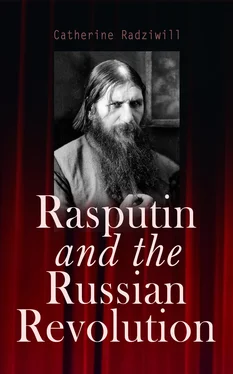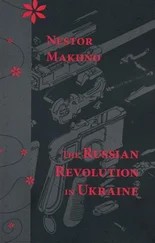In the long intrigue which came to an end by the publication of the Manifesto of Pskov, Rasputin undoubtedly played a considerable part, but all unconsciously. Those who used him, together with his influence, were very careful not to initiate him into their different schemes. But they paid him, they fed him, they gave him champagne to drink and pretty women to make love to in order to induce him to represent them to the Empress as being the only men capable of saving Russia, about which she did not care, and her crown, to which she was so attached. With Rasputin she never discussed politics, nor did the Emperor. But with his friends she talked over every political subject of importance to the welfare of the nation, and being convinced that they were the men best capable of upholding her interests, she forced them upon her husband and compelled him to follow the advice which they gave. She could not bear contradiction, and she loved flattery. She was convinced that no one was more clever than herself, and she wished to impose her views everywhere and upon every occasion.
Few sovereigns have been hated as she has been. In every class of society her name was mentioned with execration, and following the introduction of Rasputin into her household this aversion which she inspired grew to a phenomenal extent. She was openly accused of degrading the position which she held and the crown which she wore. In every town and village of the empire her conduct came to be discussed and her person to be cursed. She was held responsible for all the mistakes that were made, for all the blunders which were committed, for all the omissions which had been deplored. And when the plot against Rasputin came to be engineered it was as much directed against the person of Alexandra Feodorovna as against that of her favourite, and it was she whom the people aimed to strike through him.
Had she shown some common sense after the murder of a man whom she well knew was considered the most dangerous enemy of the Romanoff dynasty things might have taken a different course. Though every one was agreed as to the necessity of a change in the system of government of Russia, though a revolution was considered inevitable, yet no one wished it to happen at the moment when it did, and all political parties were agreed as to the necessity of postponing it until after the war. But the exasperation of the Empress against those who had removed her favourite led her to trust even more in those whom he had introduced and recommended to her attention. She threw herself with a renewed vigour into their schemes, urging her husband to dishonour himself, together with his signature, by turning traitor to his allies and to his promises. She wanted him to conclude a peace with Germany that would have allowed her a free hand in her desires to punish all the people who had conspired against her and against the man upon whom she had looked as a saviour and a saint. Once this fact was recognised the revolution became inevitable. It is to the credit of Russia that it took place with the dignity that has marked its development and success.
This, in broad lines, is the summary of the causes that have brought about the fall of the Romanoff dynasty, and they must never be lost sight of when one is trying to describe it. It is, however, far too early to judge the Russian revolution in its effects because, for one thing, it is far from being at an end, and may yet take quite an unexpected turn. For another, the events connected with it are still too fresh to be considered from an objective point of view. I have, therefore, refrained from expressing an opinion in this narrative. My aim has been to present to my readers a description of the personality of Rasputin, together with the part, such as I know it, that he has played in the development of Russian history during the last five years or so, and afterward to describe the course of the revolution and the reasons that have led to its explosion in such an unexpected manner.
Table of Contents
We live in strange times, when strange things happen which at first sight seem unintelligible and the reason for which we fail to grasp. Even in Russia, where Rasputin had become the most talked-of person in the whole empire, few people fully realised what he was and what had been the part which he had played in Russia’s modern history. Yet during the last ten years his name had become a familiar one in the palaces of the great nobles whose names were written down in the Golden Book of the aristocracy of the country, as well as in the huts of the poorest peasants in the land. At a time when incredulity was attacking the heart and the intelligence of the Russian nation the appearance of this vagrant preacher and adept of one of the most persecuted sects in the empire was almost as great an event as was that of Cagliostro during the years which preceded the fall of the old French monarchy.
There was, however, a great difference between the two personages. One was a courtier and a refined man of the world, while the other was only an uncouth peasant, with a crude cunning which made him discover soon in what direction his bread could be buttered and what advantages he might reap out of the extraordinary positions to which events, together with the ambitions of a few, had carried him. He was a perfect impersonation of the kind of individual known in the annals of Russian history as “Wremienschtchik,” literally “the Man of the Day,” an appellation which since the times of Peter the Great had clung to all the different favourites of Russian sovereigns. There was one difference, however, and this a most essential one. He had never been the favourite of the present Czar, who perhaps did not feel as sorry as might have been expected by his sudden disappearance from the scene of the world.
I shall say a thing which perhaps will surprise my readers. Personally, Rasputin was never the omnipotent man he was believed to be, and more than once most of the things which were attributed to him were not at all his own work. But he liked the public to think that he had a finger in every pie that was being baked. And he contrived to imbue Russian society at large with such a profound conviction that he could do absolutely everything he chose in regard to the placing or displacing of people in high places, obtaining money grants and government contracts for his various “protégés,” that very often the persons upon whom certain things depended hastened to grant them to those who asked in the name of Rasputin, out of sheer fright of finding this terrible being in their way. They feared to refuse compliance with any request preferred to them either by himself or by one who could recommend himself on the strength of his good offices on their behalf. But Rasputin was the tool of a man far more clever than himself, Count Witte. It was partly due to the latter’s influence and directions that he tried to mix himself up in affairs of state and to give advice to people whom he thought to be in need of it. He was an illiterate brute, but he had all the instincts of a domineering mind which circumstances and the station of life in which he had been born had prevented from developing. He had also something else—an undoubted magnetic force, which allowed him to add auto-suggestion to all his words and which made even unbelieving people succumb sometimes to the hypnotic practices which he most undoubtedly exercised to a considerable extent during the last years of his adventurous existence.
Amidst the discontent which, it would be idle to deny, had existed in the Russian empire during the period which immediately preceded the great war the personality of Rasputin had played a great part in giving to certain people the opportunity to exploit his almost constant presence at the side of the sovereign as a means to foment public opinion against the Emperor and to throw discredit upon him by representing him as being entirely under the influence of the cunning peasant who, by a strange freak of destiny, had suddenly become far more powerful than the strongest ministers themselves. The press belonging to the opposition parties had got into the habit of attacking him and calling his attendance on the imperial court an open scandal, which ought in the interest of the dynasty to be put an end to by every means available.
Читать дальше












